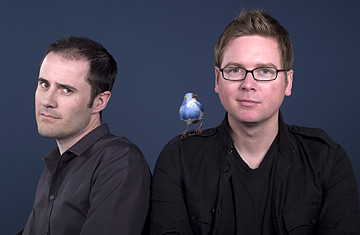
Evan Williams and Biz Stone of Twitter
(4 of 8)
Put those three elements together--social networks, live searching and link-sharing--and you have a cocktail that poses what may amount to the most interesting alternative to Google's near monopoly in searching. At its heart, Google's system is built around the slow, anonymous accumulation of authority: pages rise to the top of Google's search results according to, in part, how many links point to them, which tends to favor older pages that have had time to build an audience. That's a fantastic solution for finding high-quality needles in the immense, spam-plagued haystack that is the contemporary Web. But it's not a particularly useful solution for finding out what people are saying right now, the in-the-moment conversation that industry pioneer John Battelle calls the "super fresh" Web. Even in its toddlerhood, Twitter is a more efficient supplier of the super-fresh Web than Google. If you're looking for interesting articles or sites devoted to Kobe Bryant, you search Google. If you're looking for interesting comments from your extended social network about the three-pointer Kobe just made 30 seconds ago, you go to Twitter.
From Toasters to Microwaves
Because Twitter's co-founders--Evan Williams, Biz Stone and Jack Dorsey--are such a central-casting vision of start-up savvy (they're quotable and charming and have the extra glamour of using a loft in San Francisco's SoMa district as a headquarters instead of a bland office park in Silicon Valley) much of the media interest in Twitter has focused on the company. Will Ev and Biz sell to Google early or play long ball? (They have already turned down a reported $500 million from Facebook.) It's an interesting question but not exactly a new plotline. Focusing on it makes you lose sight of the much more significant point about the Twitter platform: the fact that many of its core features and applications have been developed by people who are not on the Twitter payroll.
This is not just a matter of people finding a new use for a tool designed to do something else. In Twitter's case, the users have been redesigning the tool itself. The convention of grouping a topic or event by the "hashtag"--#hackedu or #inauguration--was spontaneously invented by the Twitter user base (as was the convention of replying to another user with the @ symbol). The ability to search a live stream of tweets was developed by another start-up altogether, Summize, which Twitter purchased last year. (Full disclosure: I am an adviser to one of the minority investors in Summize.) Thanks to these innovations, following a live feed of tweets about an event--political debates or Lost episodes--has become a central part of the Twitter experience. But just 12 months ago, that mode of interaction would have been technically impossible using Twitter. It's like inventing a toaster oven and then looking around a year later and seeing that your customers have of their own accord figured out a way to turn it into a microwave.
